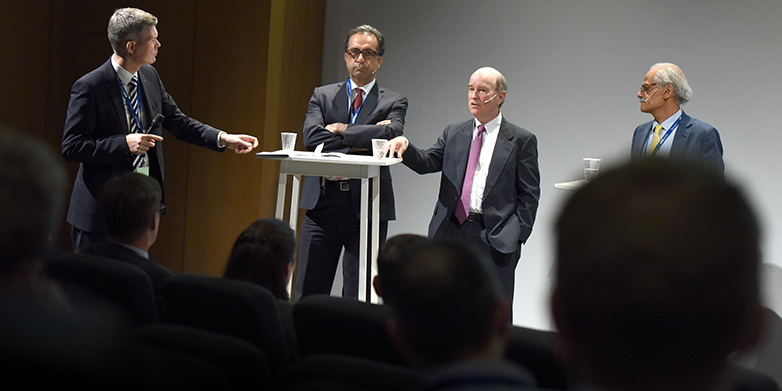A Herculean task with no ready-made solution
On Monday, the Energy Science Center at ETH Zurich and the Energy Initiative of the Massachusetts Institute of Technology (MIT) welcomed guests to a joint symposium in Zurich on the future of global energy supplies. Greater energy efficiency, improved battery performance and the digitalisation of energy systems will make key contributions.

Never before has mankind faced challenges of this scale in terms of its supply of cheap energy: at last December’s climate summit in Paris, 195 states agreed to limit global warming to less than 2 degrees Celsius relative to pre-industrial times. This means that by 2050 we will need to dispense largely with the burning of fossil fuels, such as oil, gas and coal – in other words, the energy sources that account for the lion’s share of our global energy supply today. At the same time, energy demand is rising steadily, not only in industrialised nations but particularly in emerging, newly industrialised countries, such as India and China.
So, under these challenging circumstances, what might our energy supply look like in the future? On 6 June, energy experts from the Massachusetts Institute of Technology (MIT) and ETH Zurich met jointly at ETH with industry representatives in order to discuss this question as part of a half-day symposium.
Greater efficiency thanks to informed consumers
The experts agreed that increased energy efficiency will form the basis of securing our energy supply in the future. Many governments today are also relying on this, as was made clear by their proposals for a reduction in greenhouse gas emissions in the run-up to the Paris climate conference. But Christopher Knittel from the MIT Sloan School of Management warned against over-high expectations: using randomised controlled studies, as are used in the field of medicine, he has shown that the savings actually achieved through efficiency schemes (e.g. subsidies for energy-efficient appliances) often fall well short of assumptions.
His colleague Massimo Filippini from D-MTEC at ETH Zurich confirmed this by showing that consumer behaviour is often far less rational than expected. Even if it were possible to conserve both our bank balances and the environment with energy-efficient appliances, we do not always make rational decisions. Filippini considers it essential that products include information and consumer-friendly data on the potential financial and energy savings, so that we can better exploit the potential for energy conservation.
Digital transformation
In the industry, too, everyone is talking about energy efficiency right now, explained Oliver Johner, Program Manager Energy Conservation at SBB. This energy-intensive company wants to cut its energy consumption by 20 per cent by 2025, not only for the sake of the environment but also in order to reduce costs. All SBB’s energy-efficiency programmes are also financially beneficial, confirmed Johner. He also said that digitalisation currently plays a key role in the field of energy management.
Steven Hartman, CTO of Power Services at GE Power, also sees digital transformation as a key factor in the energy supply of the future. His company has opened multiple centres of competence, in which about 1,500 engineers address this topic. One of their approaches is to use data more shrewdly in order to further optimise the way that energy systems are combined and coordinated with each other.
The topic of energy storage is also on everyone’s lips. Storage capabilities are essential for the integration of new renewable energies, such as wind and solar power, into the grid, as these are often generated outside peak hours. Donald Sadoway from the Department of Materials Science and Engineering at MIT emphasised the need to base the development of new types of batteries from the outset on sufficiently available chemical elements, such as silicon instead of platinum. His colleague Vanessa Wood from D-ITET at ETH Zurich called for closer cooperation with industry, since that is where a great deal of battery expertise is concentrated and only big corporations can deliver rapid commercialisation of technological breakthroughs.
Fusion reactors and awareness
As expected, all the participants in the closing panel discussion agreed that fundamental academic research in the field of energy is more urgent than ever. Accordingly, they also expressed a desire for more comprehensive public funding. Andreas Ulbig, co-founder of ETH start-up external pageAdaptricitycall_made, which advises energy suppliers on the use of intelligent smart grid technologies, says that industry must be more willing to take risks and put existing innovations into practice. He puts the onus for this partly on politicians, who, he says, need to ensure planning reliability and provide a certain latitude in dealing with existing regulations.
Finally, Robert Armstrong, director of the MIT Energy Initiative, introduced to the discussion another unorthodox source of energy: fusion reactors. At MIT, several groups are carrying out research into technologies based on plasma and strong magnetic fields, which Armstrong considers promising in the medium term. However, it is clear to Armstrong’s colleague Ahmed Ghoniem, from MIT’s Department of Mechanical Engineering, that technical innovations alone cannot tackle the challenges currently facing the energy sector. He is counting on campaigns and outreach work to raise citizens’ awareness of their own responsibilities in terms of climate change and increasing energy consumption. Thus, he wants to see closer cooperation between engineers on the one hand and social scientists and economists on the other.
Despite the Herculean task we face given climate scientists’ forecasts, and despite the many questions that remain unanswered, Marco Mazzotti from the Energy Science Center at ETH closed the conference with a message of hope: in his daily teaching work, he sees the passion and innovative spirit of his students. He says he can count on them to accelerate our conversion to a more sustainable future.
